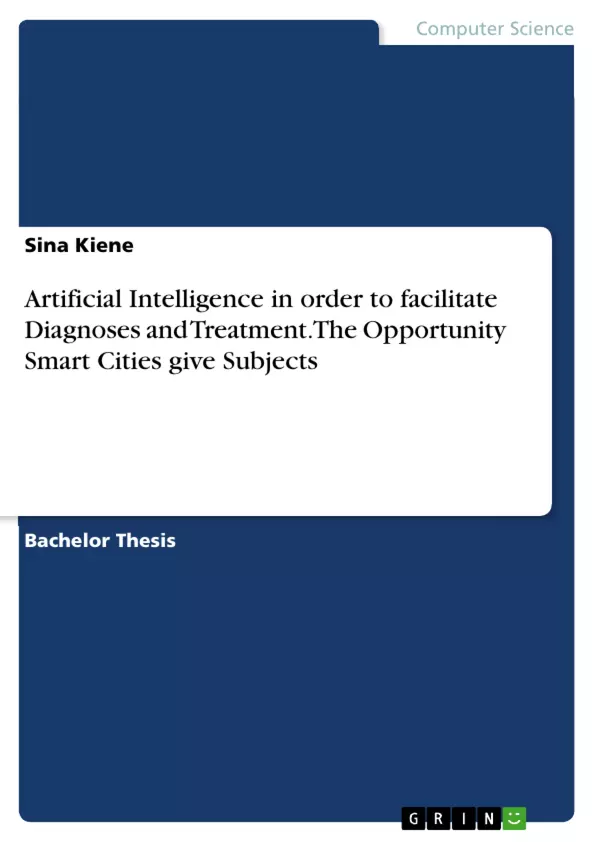This bachelor thesis is based on the approach of providing nowadays society with solutions through the advancement of Artificial Intelligence in order to improve their quality of life. For the reason that the obstacles within the health sector are evolving in a negative sense a special focus within this concept is laid on Artificial Intelligence systems impact within the health sector of mental illnesses. Thus being said the structure of the thesis focuses on four key theories in the beginning which arise over and over within the thesis. These four key theories included: The Wave Approach by Toeffler, the definition of three identities, Neuroscience and Mental Illnesses (burn-out, depression and anxiety). Nevertheless, the thesis was examined in several other parts such as Artificial Intelligence and the technology behind it, the implementation of AI in smart cities, pattern recognition and monitoring in the health sector.
By focusing on such areas, analysing and connecting them with past approaches the impact of the data was described and analysed. Thus being said the thesis approach was coming to the conclusion that through the implementation of Artificial Intelligence systems such as voice recognition systems and facial recognition systems the area of diagnosing mental illnesses and improving treatment as well as reaching for quicker response rate — in regards to emergencies — can be reached.
Inhaltsverzeichnis (Table of Contents)
- 1.0 Introduction
- 1.1 Background Information
- 1.2 Thesis Topic
- 1.3 Thesis & Hypotheses
- 2.0 Methodology
- 2.1 Literature Review
- 2.2 Case study
- 2.3 Expert Interviews
- 3.0 Key Theory Definitions & Explanations
- 3.1 The Wave Approach
- 3.2 Identities of the Society
- 3.3 Neuroscience
- 3.4 The Correlation between Depression, Anxiety and Burn-out
- 4.0 The Technology behind Artificial Intelligence
- 4.1 The Internet of Things
- 4.2 The Rise of Smart Cities and its Impact on Human Life
- 4.3 Smart Devices as AI & Data Collection
- 4.4 Challenges of AI in its implementation in Smart Cities
- 5.0 AI in Smart Cities with the Focus on Health
- 5.1 The Role of AI in Mental Health
- 6.0 Societal & Cultural Transformation
Zielsetzung und Themenschwerpunkte (Objectives and Key Themes)
This bachelor thesis examines the potential of artificial intelligence (AI) within smart cities to address challenges in healthcare, particularly focusing on mental health diagnoses and treatments. It seeks to understand how AI systems can improve quality of life by offering solutions for societal issues.
- The Impact of AI in Smart Cities
- The Role of AI in Mental Health
- The Technological Infrastructure of Smart Cities and AI Systems
- Societal and Cultural Transformation Driven by AI
- The Challenges and Opportunities Presented by AI Implementation
Zusammenfassung der Kapitel (Chapter Summaries)
The thesis begins with a detailed introduction to the topic, providing background information and outlining the key arguments and hypotheses. It then explores the methodology used, encompassing literature review, case study, and expert interviews. Chapters 3 and 4 delve into the theoretical frameworks underpinning the thesis, including the Wave Approach, societal identities, neuroscience, and the technology behind AI. Subsequently, the thesis examines the application of AI in smart cities, focusing on its role in mental health and the societal and cultural transformations it can bring about.
Schlüsselwörter (Keywords)
The central focus of this bachelor thesis lies in the exploration of Artificial Intelligence (AI), its integration within smart cities, and its potential to revolutionize the health sector, particularly mental health diagnostics and treatment. The work examines key aspects like monitoring, emotions, mental illnesses, and the use of AI technologies such as voice and facial recognition systems.
Frequently Asked Questions
How can AI improve mental health diagnosis?
AI systems like voice and facial recognition can help identify patterns associated with depression, anxiety, and burnout for quicker diagnosis.
What is a Smart City?
A Smart City uses technology and data collection (IoT) to improve the quality of life, efficiency of services, and healthcare for its residents.
What is Toffler's Wave Approach?
It is a theory describing the evolution of society through different "waves" of technological and social change, used here to contextualize the rise of AI.
What role does the Internet of Things (IoT) play in health?
IoT devices collect real-time data that AI can analyze to monitor patients' health and respond faster to medical emergencies.
What are the challenges of implementing AI in Smart Cities?
The thesis examines technological infrastructure, privacy concerns, and the societal transformation required for successful AI integration.
- Quote paper
- Sina Kiene (Author), 2020, Artificial Intelligence in order to facilitate Diagnoses and Treatment. The Opportunity Smart Cities give Subjects, Munich, GRIN Verlag, https://www.grin.com/document/994741



